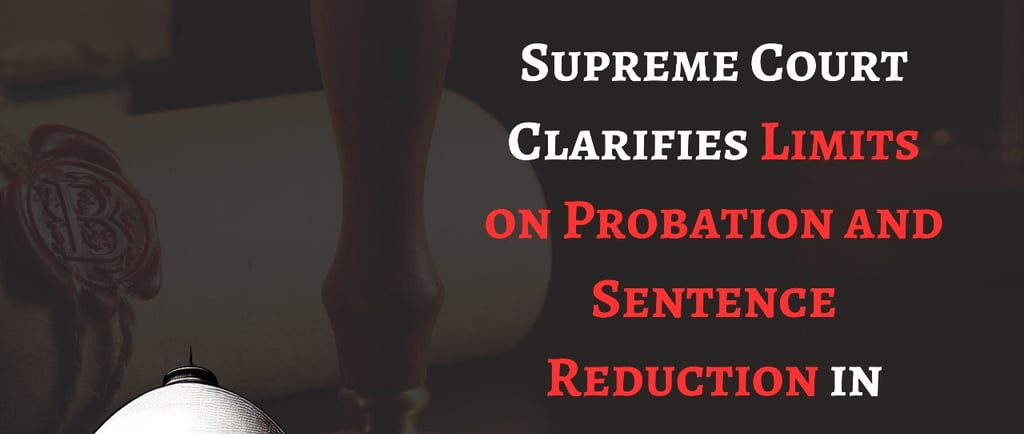Supreme Court Clarifies Limits on Probation and Sentence Reduction in Food Adulteration Cases
New Delhi, May 15, 2025 — In a landmark judgment, the Supreme Court of India ruled on two criminal appeals concerning the sentencing framework under the repealed Prevention of Food Adulteration Act, 1954 (PoFA Act). The verdict clarifies the applicability of the Probation of Offenders Act and the potential for sentence reduction under the new Food Safety and Standards Act, 2006 (FSS Act).
5/18/20253 min read


A two-judge bench comprising Justices Dipankar Datta and Manmohan delivered a consolidated decision in the cases of Nagarajan & Anr. v. State of Tamil Nadu and Naresh Chandra v. State of Uttar Pradesh, both revolving around convictions for offences under the PoFA Act.
Background of the Cases
The lead appeal involved Nagarajan and Selvaraj, shopkeepers from Tamil Nadu, who were convicted in 2006 for selling adulterated curd. Analysis of a sample revealed non-compliance with prescribed fat content under the PoFA Act. The Trial Court sentenced both to six months' simple imprisonment and a fine. Their appeal and subsequent revision petition were dismissed by the High Court of Madras.
The second case involved Naresh Chandra from Uttar Pradesh, convicted in 1987 for obstructing a food inspector from collecting samples of his products. His conviction under Section 7/10(1) read with Section 16(1)(c)(d) of the PoFA Act was upheld by the Allahabad High Court.
Common Legal Questions
Both cases hinged on two pivotal questions of law:
Can offenders convicted under the PoFA Act between 1976 and 2006 be granted the benefit of probation under the Probation of Offenders Act, 1958?
Can the reduced sentencing provisions under the repealing FSS Act be retrospectively applied to such convictions?
Arguments Presented
Counsel for the appellants argued that:
Section 20AA of the PoFA Act, which excludes the application of the Probation of Offenders Act to adult offenders, is arbitrary and violates Articles 14 and 21 of the Constitution.
The repeal of the PoFA Act and its replacement by the FSS Act, which prescribes lighter penalties, demonstrates legislative intent towards a more reformative justice model.
Denying the benefits of probation or lighter sentencing conflicts with principles under Section 360 of the Criminal Procedure Code and international human rights instruments such as Article 15 of the ICCPR.
The State of Tamil Nadu countered by emphasizing that Section 20AA explicitly disallows probation for offenders above 18 years and reflects a strong legislative policy against food adulteration.
Supreme Court’s Findings
Probation Inapplicable Between 1976–2006
The bench held that Section 20AA, introduced in 1976, clearly bars the application of the Probation of Offenders Act to adult offenders convicted under the PoFA Act. The Court emphasized the literal interpretation of statutes, noting that beneficial construction principles cannot override an explicit legislative bar.
Quoting the ruling in Babu Ram v. State of Haryana, the Court observed that a special provision like Section 20AA overrides general laws on probation. The judgment also relied on prior decisions including Prem Ballab, Pyarali K. Tejani, and Ishar Das, which highlighted the gravity of food adulteration as an anti-social and economic offence undeserving of probation.
No Sentence Reduction Under FSS Act
The appellants also urged that their sentences be modified to align with the milder punishments prescribed by the FSS Act, which repealed the PoFA Act in 2006. However, the Supreme Court found that Section 97 of the FSS Act — the "Repeal and Savings" clause — expressly preserves penalties for offences committed under the old law.
The bench distinguished the present case from the precedent in T. Barai v. Henry Ah Hoe, stating that the Barai decision dealt with conflicting Central and State laws and did not involve a repeal-and-savings situation. Furthermore, in line with the ruling in Basheer v. State of Kerala, the Court reiterated that where savings clauses protect past penalties, courts cannot reduce sentences simply due to legislative changes.
Relief Granted on Equitable Grounds
Despite ruling against the appellants on both legal questions, the Court took a nuanced approach in delivering justice. Referring to discrepancies in the curd analysis in Nagarajan's case — where the Central Food Laboratory found fat content higher than required — the Court invoked the precedent in C. Mohammed v. State of Kerala to convert the jail term into a monetary fine of ₹30,000 each.
Similarly, while expressing reservations about a previous decision in A.K. Sarkar & Co. that allowed sentence reduction, the bench upheld the reasoning for the sake of judicial consistency and finality. Consequently, Naresh Chandra’s six-month prison sentence was also converted into a fine of ₹20,000.
The Court gave all appellants time until the end of June 2025 to pay the fines, failing which the original imprisonment terms would be reinstated.
Key Takeaways from the Judgment
Probation Not Allowed: Convicts under the PoFA Act between 1976 and 2006 cannot claim the benefit of probation due to Section 20AA, which expressly excludes such relief.
No Automatic Sentence Reduction: Even if a new law prescribes lighter punishment, courts cannot reduce sentences from the repealed law if the savings clause protects the old penalties.
Legislative Intent Prevails: The judiciary emphasized its duty to honor the legislature's intent, particularly in matters involving public health and food safety.
Judicial Discretion for Justice: Despite the strict legal stance, the Court demonstrated sensitivity to the age of the cases (from 1985 and 2001) and ensured that justice was tempered with equity.
Conclusion
The Supreme Court’s judgment not only resolves a key legal ambiguity but also serves as a precedent for future sentencing in repealed statute contexts. By upholding statutory clarity and legislative supremacy while allowing equitable relief, the ruling strikes a balance between the rule of law and the demands of justice.
